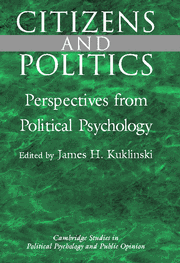Book contents
- Frontmatter
- Contents
- List of Contributors
- Prologue: Political Psychology and the Study of Citizens and Politics
- PART I AFFECT AND EMOTIONS
- PART II POLITICAL COGNITION
- PART III POLITICAL ATTITUDES AND PERCEPTIONS
- Introduction
- 9 Public Opinion and Democratic Politics: The Problem of Nonattitudes and Social Construction of Political Judgment
- 10 Implications of a Latitude-Theory Model of Citizen Attitudes for Political Campaigning, Debate, and Representation
- 11 Where You Stand Depends on What You See: Connections Among Values, Perceptions of Fact, and Political Prescriptions
- 12 Commentary: The Meaning of “Attitude” in Representative Democracies
- PART IV POLITICAL VALUES
- Index
- Titles in the series
11 - Where You Stand Depends on What You See: Connections Among Values, Perceptions of Fact, and Political Prescriptions
Published online by Cambridge University Press: 07 October 2011
- Frontmatter
- Contents
- List of Contributors
- Prologue: Political Psychology and the Study of Citizens and Politics
- PART I AFFECT AND EMOTIONS
- PART II POLITICAL COGNITION
- PART III POLITICAL ATTITUDES AND PERCEPTIONS
- Introduction
- 9 Public Opinion and Democratic Politics: The Problem of Nonattitudes and Social Construction of Political Judgment
- 10 Implications of a Latitude-Theory Model of Citizen Attitudes for Political Campaigning, Debate, and Representation
- 11 Where You Stand Depends on What You See: Connections Among Values, Perceptions of Fact, and Political Prescriptions
- 12 Commentary: The Meaning of “Attitude” in Representative Democracies
- PART IV POLITICAL VALUES
- Index
- Titles in the series
Summary
We must note particularly … the insertion between man and his environment of a pseudo-environment. To that pseudo-environment his behavior is a response. … The analyst of public opinion must begin then, by recognizing the triangular relationship between the scene of action, the human picture of that scene, and the human response to that picture working itself out upon the scene of action.
Walter LippmannOne good solid murder of a baby or a rape-murder of a 7-year-old girl will outweigh a ton of statistics.
Lawrence Friedman, explaining popular perceptions of a rising crime rateIncluding values as a central component of the study of public opinion was long overdue, and therefore their appearance in this volume is a cause for celebration. Of course, if values are defined broadly enough, public opinion researchers have been studying values for decades, if not centuries. Alexis de Tocqueville sampled the American public in the 1830s and analyzed Americans' distinctive values both as independent and as dependent variables. So did James Bryce a few decades later and Hector St. John de Crévecoeur a few decades earlier. Scholars using qualitative interviews and ethnographic techniques to explore values succeeded Europeans with notepads around the turn of the twentieth century (Hochschild, 1981; Lane, 1962; Lynd and Lynd, 1929; Warner, 1949), and they, in turn, were succeeded by survey researchers measuring the origins of authoritarianism or the importance of family ties in partisan identification (Adorno et al., 1950; Niemi and Weisberg, 1993, sections II and III).
- Type
- Chapter
- Information
- Citizens and PoliticsPerspectives from Political Psychology, pp. 313 - 340Publisher: Cambridge University PressPrint publication year: 2001
- 22
- Cited by



